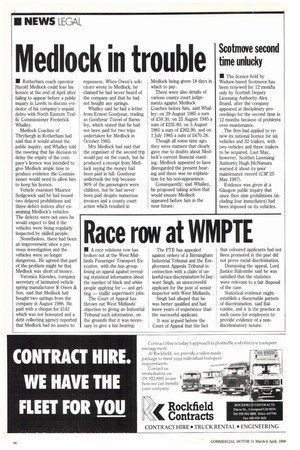Medlock in trouble
Page 30

If you've noticed an error in this article please click here to report it so we can fix it.
• Rotherham coach operator Harold Medlock could lose his licence at the end of April after failing to appear before a public inquiry in Leeds to discuss evidence of his company's unpaid debts with North Eastern Traffic Commissioner Frederick Whalley.
Medlock Coaches of Thrybergh in Rotherham had said that it would attend the public inquiry, and Whalley told the meeting that his decision to delay the expiry of the company's licence was intended to give Medlock ample time to produce evidence the Commissioner would need to allow him to keep his licence.
Vehicle examiner Maurice Sedgewick said he had issued two delayed prohibitions and three defect notices after examining Medlock's vehicles. The defects were not ones he would expect to find if the vehicles were being regularly inspected by skilled people.
Nonetheless, there had been an improvement since a previous investigation and the vehicles were no longer dangerous. He agreed that part of the problem might be that Medlock was short of money.
Veronica Knowles, company secretary of laminated vehicle spring manufacturer R Owen & Son, said that Medlock had bought two springs from the company in August 1986. He paid with a cheque for 2142 which was not honoured and a debt collecting agency reported that Medlock had no assets to repossess. When Owen's solicitors wrote to Medlock, he claimed he had never heard of the company and that he had not bought any springs.
Whalley said he had a letter from Ernest Goodyear, trading as Goodyear Travel of Barnsley, which stated that he had not been paid for two trips undertaken for Medlock in October 1985.
Mrs Medlock had said that the organiser of the second trip would pay on the coach, but he produced a receipt from Medlock saying the money had been paid in full. Goodyear undertook the trip because 90% of the passengers were children, but he had never been paid despite numerous invoices and a county court action which resulted in Medlock being given 18 days in which to pay.
There were also details of various county court judgements against Medlock Coaches before him, said Whalley: on 29 August 1985 a sum of .259.30, on 23 August 1985 a sum of 2235.80, on 5 August 1985 a sum of 2262.90, and on 1 July 1985 a sum of 2470.28.
Though all some time ago, they were matters that clearly gave rise to doubts about Medlock's current financial standing. Medlock appeared to have disregarded the present hearing and there was no explanation for his non-appearance.
Consequently, said Whalley, he proposed taking action that would ensure Medlock appeared before him in the near future.
















































































































































